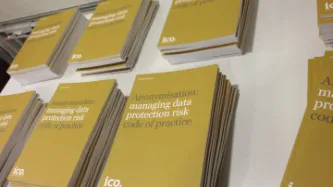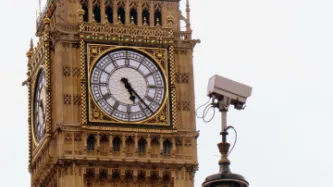Search
Content type: News & Analysis
On Monday, Privacy International submitted a dossier to the National Cyber Crime Unit of the National Crime Agency on behalf of Ethiopian political refugee Tadesse Kersmo, asking them to investigate the potentially unlawful interception of Tadesse's communications, as well as the role a British company played in developing and exporting the invasive commercial surveillance software called FinSpy that was found on Tadesse's computer.
Here, we address some of…
Content type: Press release
In response to the ruling against David Miranda over his detention at Heathrow, Privacy International Executive Director Dr. Gus Hosein said:
Schedule 7 of the Terrorism Act of 2000 is a law intended to fight terrorism, and was not drafted to target people like David Miranda. In this instance however the government used it to seize the devices of journalists to intimidate and obstruct the reporting of mass and unlawful surveillance practices of the British government. To equate journalism…
Content type: News & Analysis
A strong, unified voice from the tech industry is absolutely essential to reforming the mass and intrusive surveillance programs being run by the Five Eyes, so we welcome today's statement from AOL, Apple, Google, Facebook, LinkedIn, Microsoft, Twitter, and Yahoo.
Companies have obligations to respect human rights and not be complicit in mass surveillance. Given what has been publicly revealed over the past six months, we must know for certain that the companies we entrust with our information…
Content type: Long Read
The recent revelations, made possible by NSA-whistleblower Edward Snowden, of the reach and scope of global surveillance practices have prompted a fundamental re- examination of the role of intelligence services in conducting coordinated cross-border surveillance.
The Five Eyes alliance of States – comprised of the United States National Security Agency (NSA), the United Kingdom’s Government Communications Headquarters (GCHQ), Canada’s Communications Security Establishment Canada (CSEC), the…
Content type: News & Analysis
With the launch of the "Eyes Wide Open" project, Privacy International has put together a fact sheet about the secretive Five Eyes alliance. Consider this a guide to the secret surveillance alliance that has infiltrated every aspect of the modern global communications system.
Beginning in 1946, an alliance of five English-speaking countries (the US, the UK, Australia, Canada and New Zealand) developed a series of bilateral agreements over more than a decade that became known as the UKUSA…
Content type: News & Analysis
For nearly 30 years, the UK's wiretapping laws have been the subject of annual reports. Since 2002, they are available around the web (for now), but earlier than that, it is a rabbit warren of possible locations.
In practice, the reports are solely available from the Parliamentary Archives if and only if you are a member of an institution which has paid for access. Requesting a copy from elsewhere sends you to this destination.
The current Interception of Communications Commissioner didn't…
Content type: News & Analysis
The following is an excerpt from a blog post that originally was published by EJIL: Talk!, and is written by Carly Nyst, Head of International Advocacy at Privacy International:
The recent revelations of global surveillance practices have prompted a fundamental re-examination of the role and responsibility of States with respect to cross-border surveillance. The patchwork of secret spying programmes and intelligence-sharing agreements implemented by parties to the Five Eyes arrangement (the US…
Content type: News & Analysis
Today's hearing was built up in some media circles as an historic ‘public grilling’ of the heads of the UK’s Intelligence Agencies as Mi5, Mi6 and GCHQ appeared in public in front of their oversight committee, the Intelligence and Security Committee.
Nothing would be further from the truth. It was tame, predictable, and limp. No member of the public concerned with the activities of our intelligence agencies would be comforted by the ISC’s performance. The Committee was almost fawning in their…
Content type: Long Read
Privacy International filed formal complaints with the Organisation for Economic Cooperation and Development (OECD) in the UK against some of the world’s leading telecommunication companies, for providing assistance to British spy agency GCHQ in the mass interception of internet and telephone traffic passing through undersea fibre optic cables.
According to recent reports, BT, Verizon Enterprise, Vodafone Cable, Viatel, Level 3, and Interoute granted access to their fibre optic…
Content type: Press release
General Assembly Should Pass Strong Resolution on the Right to Privacy in the Digital Age
(New York, November 21, 2013) – The United Nations General Assembly should approve a new resolution and make clear that indiscriminate surveillance is never consistent with the right to privacy, five human rights organizations said in a November 21, 2013 letter to members of the United Nations General Assembly.
After heated negotiations, the draft resolution on digital…
Content type: News & Analysis
Just search for the term "surveillance state" and you’ll pull up various uses of the term or news articles citing the phrase.
In some respects, this newfound concern can’t be a surprise; given vast new amounts of information in the public sphere since the Edward Snowden leaks began in June. However, it is critical to nail down the exact meaning of the term, so as the public and governments have the debate over State spying, we can actually know what we're talking about. Most importantly, this…
Content type: News & Analysis
For the first time since the Snowden revelations exposed the vast reach and scope of Britain's surveillance and intelligence activities, Parliament will openly debate the need for greater oversight of the intelligence and security services.
In the five months since the first of the Snowden leaks offered an insight into the government's mass surveillance capabilities, the political discourse has been disappointingly devoid of any serious discussion of the fundamental issues raised about the…
Content type: News & Analysis
http://www.spiegel.de/international/world/how-the-nsa-spies-on-international-bank-transactions-a-922430.html*Update: The European Parliament has voted to recommend suspension of its Terrorist Finance Tracking Program (TFTP) agreement with the US. The vote in favour of suspension only highlights how the NSA’s reported activities have undermined the agreement. Negotiations should immediately commence to strengthen the privacy and redress provisions, to ensure that governments…
Content type: Press release
Civil society organisations today called upon the members of the Human Rights Council to assess whether national surveillance laws and activities are in line with their international human rights obligations.
The Snowden revelations have confirmed that governments worldwide continue to expand their spying capabilities, at home and abroad. Widespread surveillance is being conducted in violation of individuals’ rights to privacy and free expression, and is seldom regulated by strong legal…
Content type: News & Analysis
This week in London, the world's largest arms fair DSEI rolled into town, bringing together some of the world’s most sophisticated killing and torture equipment with some of the world’s worst human rights abusers. On sale this year was also some of the UK’s premier lawful interception and surveillance technology.
Considering the forum in which these technologies are being sold, and the caliber of customers looking to buy it, you would think that the sale of such…
Content type: News & Analysis
It was only a year ago when the UK Home Office repeatedly made statements about how their capability to collect intelligence was degrading, and how new laws such as the Communications Data Bill were necessary to protect citizens.
In hindsight, given the revelations about the UK domestic mass surveillance programs, these once desperate cries for more crime- and terrorism-fighting tools now look like nothing more than attempts to illegitimately spy more on all citizens. Quotes from those debates…
Content type: Press release
In the wake of revelations that the UK Government is accessing wide-ranging intelligence information from the US and is conducting mass surveillance on citizens across the UK, Privacy International today commenced legal action against the Government, charging that the expansive spying regime is seemingly operated outside of the rule of law, lacks any accountability, and is neither necessary nor proportionate.
The claim, filed in the Investigatory Powers Tribunal (IPT), challenges the UK…
Content type: News & Analysis
Out of concern for the potential international ramifications of the Communications Data Bill, fifteen of Privacy International's partner activists and organisations have signed a joint letter urging the UK to consider the detrimental impact this law will have around the world.
The letter reads:
Dear Editor,
The United Kingdom’s proposed Communications Data Bill is not only sinister in its intention to enable the UK government to monitor and control the internet, but it is ill-…
Content type: News & Analysis
A full analysis of the UK Information Commissioner's "Anonymisation code of practice: managing data protection risk" will take time and working knowledge of how the code is used in practice.
At the launch, the ICO signalled that while they believed the code was now up to scratch, they were open to additions and clarifications given that it is the first document of its kind in the world. We applaud them for this; the code is likely to be copied internationally, so it is particularly…
Content type: News & Analysis
Twelve years after the Regulation of Investigatory Powers Act (RIPA) was passed by the UK Parliament, permitting the interception of communications without a judicial warrant and allowing the police to self-authorise access to communications metadata, some parts of this dangerous law are finally being properly scrutinised. This isn't an intentional review, but rather a by-product of a joint parliamentary committee's interrogation of the draft Communications Data Bill, the Home Office's…
Content type: News & Analysis
Privacy International is proud to announce our new project, Eyes Wide Open, which aims to pry open the Five Eyes arrangement and bring it under the rule of law. Read our Special Report "Eyes Wide Open" and learn more about the project below.
For almost 70 years, a secret post-war alliance of five English-speaking countries has been building a global surveillance infrastructure to “master the internet” and spy on the worlds communications. This arrangement binds together the US, UK, Canada,…
Content type: Report
This report was submitted to the Joint Committee on Human Rights. Under the current version of the draft Communications Data Bill, records of every person or entity with whom any given individual has communicated electronically would be collected continuously and stored for one year. These records would include the time of the communication and the location from which it originated.
The Communications Data Bill raises a number of concerns with regards to the right to privacy under Article 8…
Content type: Report
This report was submitted to the Joint Committee on Human Rights. Under the current version of the draft Communications Data Bill, records of every person or entity with whom any given individual has communicated electronically would be collected continuously and stored for one year. These records would include the time of the communication and the location from which it originated.
The Communications Data Bill raises a number of concerns with regards to the right to privacy under Article 8 of…
Content type: News & Analysis
The Home Office has been planning a grab for new communications surveillance powers since 2006; today, the Draft Communications Data Bill established in legislative language their ambitions.
Yes, as they will point out, it isn't their the full scope of their ambitions. In 2008, under Labour, they proposed the idea of a vast centralised database of the nation's communications data. In 2009 they abandoned the idea of a central database. Since then, a new government has been elected,…
Content type: Press release
The government today published a draft version of a bill that, if signed into law in its current form, would force Internet Service Providers (ISPs) and mobile phone network providers in Britain to install 'black boxes' in order to collect and store information on everyone's internet and phone activity, and give the police the ability to self-authorise access to this information. However, the Home Office failed to explain whether or not companies like Facebook, Google and Twitter will be…
Content type: News & Analysis
On Thursday 19th April, Privacy International - in partnership with the LSE, the Foundation for Information Policy Research, Open Rights Group and Big Brother Watch - hosted Scrambling for Safety 2012, a discussion of the Home Office's new plans for mass interception in the UK. Around 200 people turned up (despite the sporadic but torrential rain!), and the number of insightful, well-informed questions from the audience proved to us that the Home Office is not going to…
Content type: News & Analysis
In September last year, David Cameron told the UN general assembly: "As people in north Africa and the Middle East stand up and give voice to their hopes for more open and democratic societies, we have an opportunity – and I would say a responsibility – to help them." The Arab Spring uprisings had provided a chink of light for those living under repressive regimes, and it was now up to western democracies to help them throw open the door to a bright new future.
Yet over the past six…
Content type: Press release
An internal Liberal Democrat briefing on Home Office plans to massively expand government surveillance was today passed to Privacy International. The document contains significant evasions and distortions about the proposed 'Communications Capabilities Development Programme' (CCDP), and is clearly intended to persuade unconvinced Lib Dem MPs to vote in favour of the proposal.
The document contains a section entitled 'Remember, under Labour' consisting of a list of the previous government's…




















